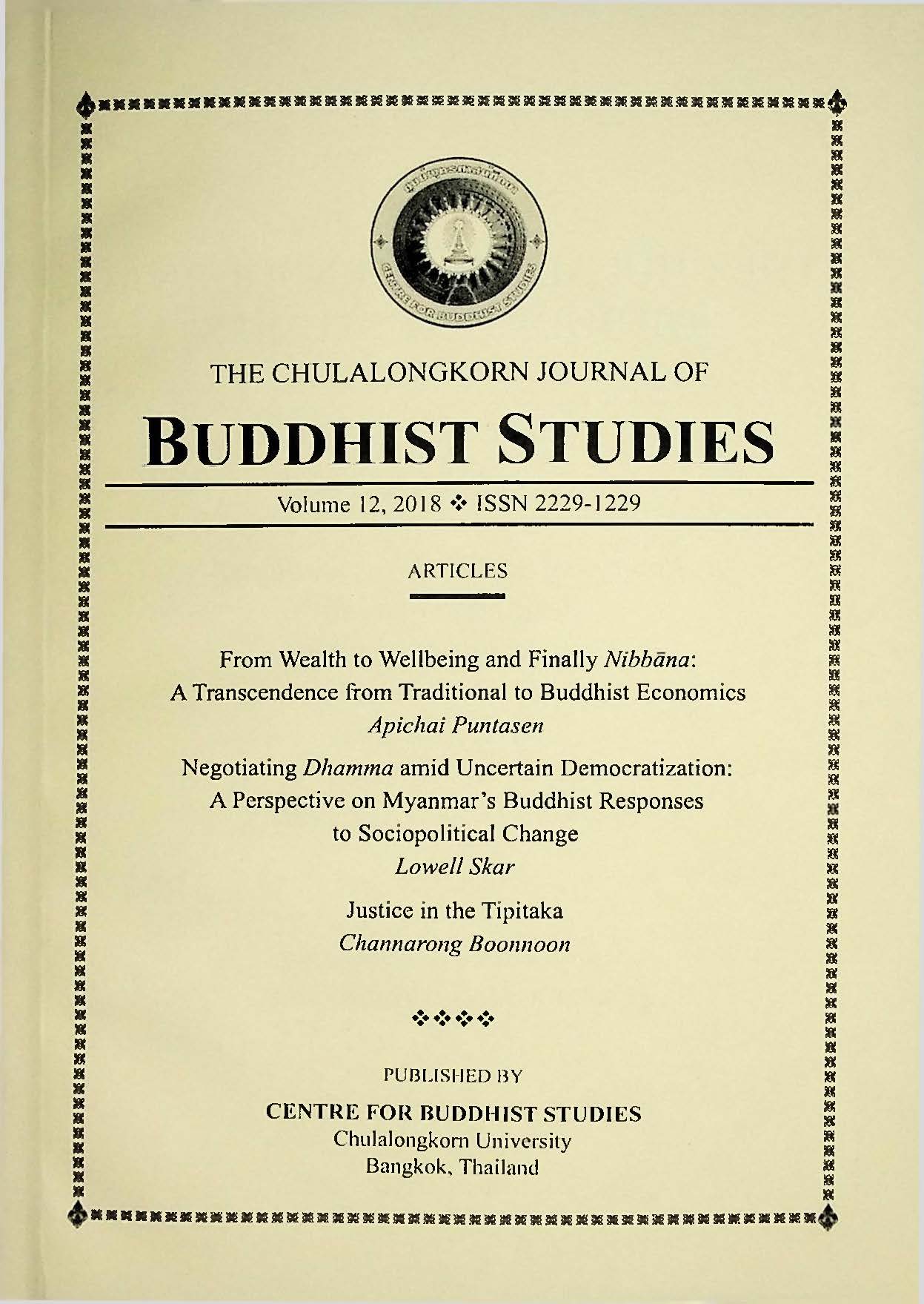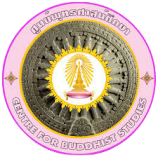From Wealth to Wellbeing and Finally Nibbtina: A Transcendence from Traditional to Buddhist Economics
Keywords:
good life, wellbeing, sustainable development, GNH, Sufficiency Economy, sukha, Buddhist economics, nibbanaAbstract
This paper traces the origin of Western economics from the time of Greek civilization to the present. It discusses the ultimate goal of economic activities from Aritotlc's “good life” or “moral life” to the search for wealth during the emergence of the Nation States in Europe, to capitalism and mercantilism in the 16"’ century, to trade monopoly facilitated by colonialism, to national wealth and aggregate production, culminating in the systematic calculation of gross national product (GNP) or gross domestic product (GDP) in the present.
The rapid growth of GN P which has become the development objective of many nations resulted in a rapid deterioration of natural resources and environment - a condition not suitable for the nourishing of all living things, especially human beings. Alternative paradigms of sustainable development were proposed by various parties such as the United Nations in 1987 and the former King of Bhutan in the 1970s through the concept of gross national happiness (GNH) of which good governance is a key component. In the Kingdom of Thailand, the late King Bhumibol Adulyadej advanced his concept of “sufficiency economy” in 1974 as an alternative to the growth-led approach. Together with GNH, sufficiency economy brings the systems analysis for sustainable development into a complete form, consisting of inputs, process output, outcome and impact, taking into account the Buddhist notion of sukha or wellbeing. Sukha is the state of mind completely liberated from all defilements - the ultimate goal of Buddhist economics which is not widely known or clearly understood. Therefore, sustainable development, GNH and sufficiency economy may serve as the bridge between the two main modes of development, and may help us gain a deeper understanding of Buddhist economics.
References
Boonyarattanasoontom, J., Komolta, M. Analyses of State Policies at Various Levels Including Private Business Sector and Civil Society from Sufficiency Economy Philosophy (2540- 2549 B.E.), Volume I. Bangkok: Thailand Research Fund, 2009.
Puntascn, A. Buddhist Economics: Evolution, Theories and Its Application to Various Economic Subjects. Bangkok: Amarin Publishing Group, 2005.
Thinley, L. J. “System of Values and Development: Gross National Happiness/’ in Gross National Happiness: Toward the New Paradigm of Development. Bangkok: Suan Nguen Mee Ma, 2004.
Bentham, J. An Introduction to the Principles of Morals and Legislation. Edited by P. Wheelwright. Garden City, NY: Doubleday, Doran & Company, 1935.
Berlin, I. “The Age of Enlightenment: The Eighteen Century Philosophers.” Great Ages in Eastern Philosophy. Boston: Houghton Mifflin, 1962.
Brundtland, G. “Report of the World Commission on Environment and Development: Our Common Future.” United Nations General Assembly Document A/42/427, 1987.
Burns, E. M. Western Civilizations: Their History and Their Culture, 5th cd. New York: W.W. Norton, 1958.
Carson, R. Silent Spring. New York: Houghton Mifflin, 2003.
Coleman, R. 2008. “Measuring Progress towards GNH - From GNH Indicators to GNH National Account?: The Nova Scotia GP1 Experience.” Lecture to the Fourth International Conference on Gross National Happiness, Thinpu, Bhutan, November 24-26, 2008.
ES Global Consulting. “Sustainable Development - Our Common Future.” ES Global: Sustainability Materiality, Reporting, Assurance and Strategy, n.d. Accessed 31 July 2019. http://www.esglobal.com/index.php/articulos-home/60-sustainability-development
Greenwald, J. “Happy Land.” Yoga Journal, July-August 2004. Accessed July 31, 2019. https://www.yogajoumal.com/lifestyle/happy-land
Hall, J. 2009. “The Global Project on Measuring the Progress of Societies,” Speech given at Sasin International Business College, July 2009, Chulalongkorn University, Thailand.
Kahneman, D. “Experienced Utility and Objective Happiness: A Moment-based Approach,” 673-692 in Kahneman, D. and Tversky, A., eds. Choices, Values, and Frames. New York: Cambridge University Press, 2000.
Layard, R. 2003 “Happiness: Has Social Service a Clue?” Lionel Robbins Memorial Lectures 2002/3, March 3-5, 2003, London School of Economics, UK.
Meadows, D. H., et al. The Limits to Growth: A Report for the Club of Rome’s Project on the Predicament of Mankind. New York: Universe Books, 1974.
Mill, J. S. Principles of Political Economy. New York: Colonial Press, 1899.
National Research Council Committee on Economic Branch, The Office of the National Research Council of Thailand. The Kings Sufficiency Economy and the Analyses of Meanings Economists. Bangkok: Parbpim, 2004.
Sufficiency Economy Movement Sub-committee. Sufficiency Economy: Implications and Applications. Bangkok: Office of the National Economic and Social Development Board, 2007.
Puntascn, A. “Buddhist Economics as a New Paradigm Towards Happiness,’’ Society and Economy 29:2 (2007): 181 -200.
Randall Jr., H. The making of the modern mind. New York: Columbia University Press, 1976.
Rothbard, M. N. Economic Thought Before Adam Smith. Brookfield: Edward Elgar, 1996.
Schumacher, E. F. Small is Beautiful: Economics Mattered. New York, Harper & Row, 1973.
Sivaraksa, S. The Wisdom of Sustainability: Buddhist Economics for the 2Ist Century. Kihei, Hawaii: Koa Books, 2009.
Smith, A. An Inquiry into the Nature and Causes of the Wealth of Nations. New York: The Modem Library, 1937.
Smith, A. The Theory of Moral Sentiments. Indianapolis: Liberty Press, 1982.
“Stiglitz report calls for measure of‘wellbeing ’ alongside growth,” France 24, September 14, 2009. Accessed July 31, 2019. https://www.france24.com/en/20090914-stiglitz-rcportcalls-measure-wellbeing-alongside-growth-
Summer, A., Tribe, M. International Development Studies. London: Sage Publication, 2008.
Sustainable Development Commission. Scope of Work Package One: Visions of Prosperity. London: Sustainable Development Commission, 2007.
Svcrigcs Riksbank Prize in Economic Sciences in Memory of Alfred Nobel 1971. NobeIPrizc.org. Nobel Media AB 2019. Accessed July 31,2019. https://www.nobclprizc.org/prizes/economic-sciences/1971 /summary/
Svcrigcs Riksbank Prize in Economic Sciences in Memory of Alfred Nobel 1971. “What is Gross National happiness” in Rethinking Development: Proceedings of the Second International Conference on Gross National Happiness (3-11). Thinpu, Bhutan: Centre for Bhutan Studies, 2007.
UNDP. “Sufficiency Economy and Human development,” in Thailand Human Development Report 2007. Bangkok: United National Development Programme, 2007.
UN Educational, Scientific and Cultural Organisation (UNESCO), UNESCO Universal Declaration on Cultural Diversity. November 2, 2001. Accessed July 31, 2019. http://portal.unesco.org/en/ev.php-URL_ID=l3179&URL_DO=DOTOPIC&URLSECTION=201.html
Ura, K. GNH Index. Thinpu, Bhutan: Centre for Bhutan Studies, 2008.
Ura, K. GNH Index. A Proposal for GNH Value Education in School. Thinpu, Bhutan: Centre for Bhutan Studies, 2008.
Whitehead, A. Science and the Modern World. New York: Free Press, 1967.
Wikipedia contributors. “Robert F. Kennedy’s remarks at the University of Kansas.” Wikipedia, The Free Encyclopedia, April 20, 2018. Accessed July 31, 2019. https://en.wikipedia.org/w/index.php?title=Robert_F._Kennedy%27s_remarks_at_the_University_of_Kansas&oldid=837427463
Wikipedia contributors. “Simon Kuznets.” Wikipedia, The Free Encyclopedia, July 15, 2019. Accessed July 31, 2019. https://en.wikipedia.org/w/index.php?title=Simon_Kuznets&oldid=906416491
Wikipedia contributors. “Sustainable development.”, July 28,2019. Accessed July 31,2019. https://en.wikipedia.Org/w/index.php?title=Sustainable_development&oldid=908248804
Working Group on Academic Affairs, National Economic and Social Advisory Council (NESAC). Formulation and Evaluation of Sufficiency Economy Indicators and the Economic and Social Report on the National Performance in the Direction of Sufficiency Economy. Ubon Ratchathani University, 2007.
Venerable Phra Brama Gunabhorn (P. A. Payutto) 2009. “Buddhist Economics in the Globalized World,” Keynote speech given at the Second Buddhist Economic Research Platform, April 5, 2009, Ubon Rajathanec University, Thailand.







